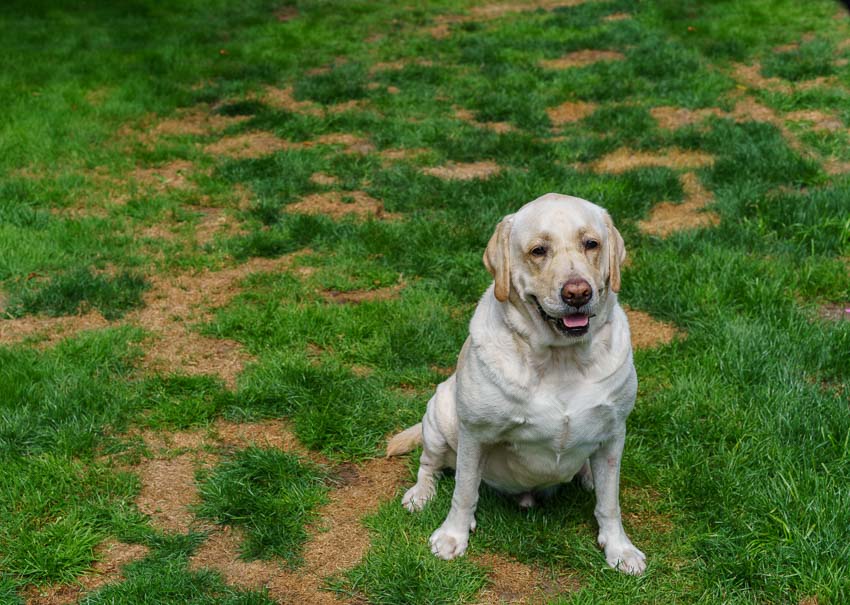Your lawn is your pride and joy, so it can be frustrating when your dog’s pee kills patches of grass. It’s not your dog’s fault, though. Dog pee kills grass because of the high nitrogen content in dog urine. Fortunately, there are some steps you can take to protect your lawn and alleviate this common problem.
Does Dog Pee Kill Grass?
If you have a dog that goes potty on your lawn every day, you’ve probably noticed dead patches of grass where it pees. Learn more about why dog pee kills grass and the role your dog’s diet plays in this process.
Why Does Dog Pee Kill Grass?
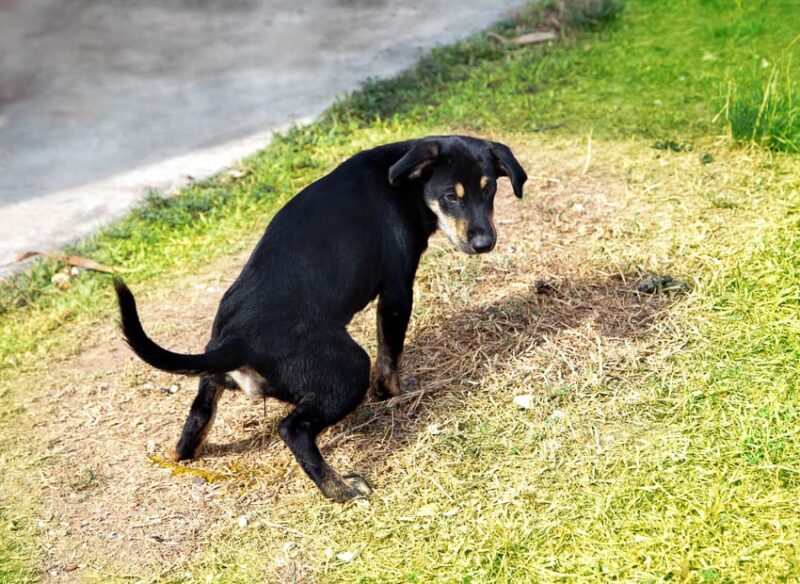
Dog pee kills grass because it is high in nitrogen. Understanding how nitrogen concentration in your dog’s urine happens and what you can do about it is the first step in solving this common problem.
The role of nitrogen and urine concentration
All urine contains urea, which is the end product of the metabolic breakdown of proteins. Dogs eat a lot of protein, so their urine contains high nitrogen concentrations.
The proteins found in low-quality processed dog food make it harder for a dog’s metabolism to break down. This results in higher nitrogen concentrations.
pH balance and its effects on grass health
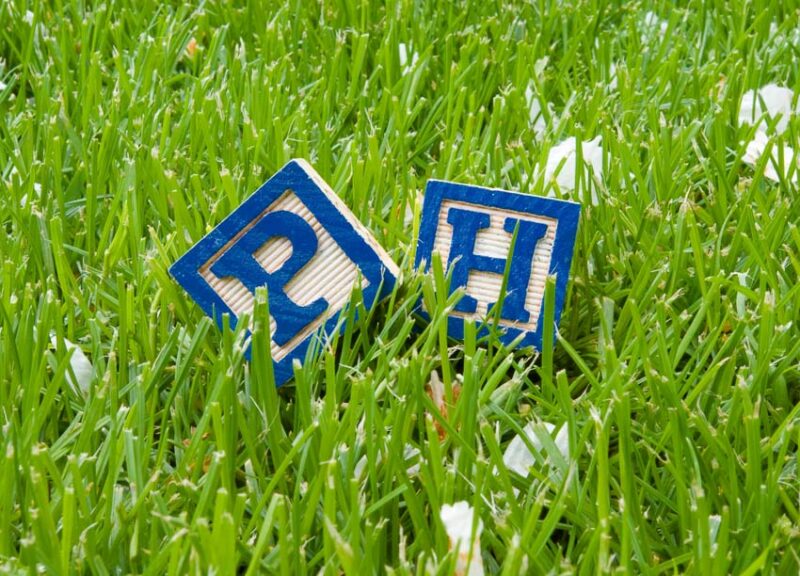
Another contributing factor to dog urine killing grass is the pH level. Some types of dog food don’t contain enough protein, which makes your dog’s urine highly alkaline.
Healthy dog urine has a pH of about 6.5, which won’t hurt your lawn due to a pH imbalance. However, it can still kill your grass because of the urea.
If your dog’s urine has a pH higher than 7.0, not only will it burn your lawn, but it can also predispose your dog to health issues like struvite crystals. On the other hand, if dog urine is below a pH of 6.0, your dog could develop calcium oxalate stones.
Does All Dogs’ Urine Kill Grass?
There is a common myth that female dog urine kills grass more than male dog urine. Yet, it has nothing to do with gender.
Female vs. male dogs: Is there a difference?
Female dogs squat to pee, which delivers a concentrated amount of urine in one small spot. Male dogs raise their hind leg and spray the urine higher, usually on a bush or pole.
If you have a young male dog or an older one that squats to pee, they will cause the same amount of damage as a female dog. It’s not about gender, it’s about the method they use to relieve themselves.
The influence of dog diet on urine composition
Feeding your dog a healthy diet with protein that’s easy for them to digest will ensure their urine won’t scald your lawn. That’s one reason people feed their pets fresh dog food from brands like The Farmer’s Dog or Ollie.
You can also make your own fresh dog food. This will be easier for them to digest and cause fewer problems with high nitrogen in their urine. Always consult your veterinarian before switching your dog’s food, though.
How to Identify Damage from Dog Pee on Your Lawn

What does dog pee damage look like on your lawn? Learn how to recognize the signs of dog urine damage and distinguish it from other causes of brown patches of grass.
Recognizing the early signs
Not all patches of dead brown grass are caused by dog urine. There are easy ways to tell if your grass has been damaged by dog pee or something else.
Color changes and patterns to watch out for
Grass needs nitrogen for green, healthy growth. However, too much nitrogen will kill your grass. That’s why the dog urine damage on your lawn usually appears as a patch of dead brown grass encircled by a ring of dark green grass.
Because grass needs a certain amount of nitrogen, the area surrounding the dead patch is the area that gets just enough nitrogen to turn dark green. If your lawn is already healthy and green, you might not get the ring of dark green around the dead patches.
Distinction between dog pee damage and other lawn problems
Grubs and lawn grass fungus are two other common lawn problems that cause dead patches of grass. It’s easy to tell the difference between dog pee damage and these other problems because dog pee doesn’t kill the grass at its roots.
On the other hand, lawn grub and fungal damage affect the roots of your grass. The easiest way to identify the problem is to tug at the roots of the grass. If they don’t come up easily, the problem is likely dog urine.
There are other ways to diagnose lawn grub damage and identify fungal diseases, so if you’re unsure, you can research those problems further.
Monitoring your lawn’s health
Lawn problems are much easier to address before they get out of hand. Monitoring your lawn’s health by conducting regular lawn inspections and assessments will help you catch problems in time to address them before they get too bad.
When to call in lawn care experts
Fixing lawn problems related to dog urine is much easier than addressing issues like lawn grubs and fungal diseases.
If you’re still unsure what the brown, dead grass on your lawn is being caused by, contact a lawn care expert. They’ll be able to diagnose and treat your lawn quickly, no matter what the problem is.
How to Stop Dog Pee from Killing Grass
Now that you know the cause of the dead patches of grass on your lawn, how do you stop dog pee from killing your grass? Thankfully, there are several ways to protect your grass and keep your four-legged friend happy at the same time.
Modifying your dog’s diet
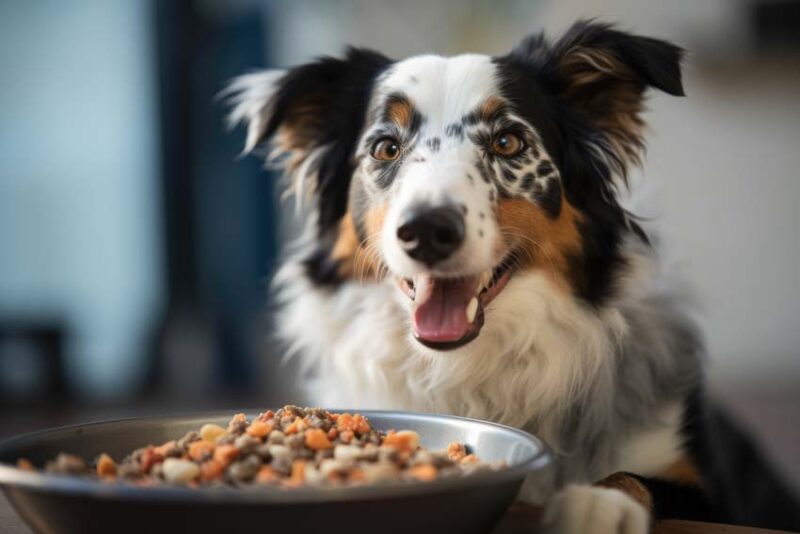
Modifying your dog’s diet is one of the best ways to keep urine from killing your grass. Making a few changes can reduce the nitrogen concentration so that it doesn’t harm your grass. These dietary changes are better for your dog, too.
Importance of hydration: Encouraging water intake
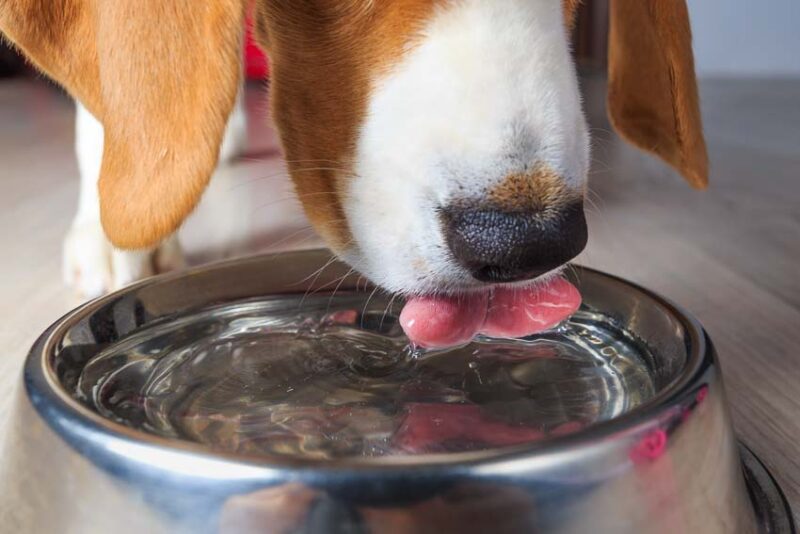
Your dog’s urine will be more concentrated if they’re not adequately hydrated, so you should make sure they drink plenty of water.
Dogs can be encouraged to drink more water by placing water bowls in multiple areas around the house and yard. Or you can use a dog drinking fountain to provide a constant supply of fresh water.
Safe supplements to reduce nitrogen concentration
In addition to increasing your dog’s water intake, you can give them supplements that reduce the nitrogen concentration in their urine, such as NaturVet Grass Saver .
Many of these products contain DL-Methionine, which has been studied for decades and is considered safe for your dog. You can also use natural supplements, such as cranberries, probiotics, and apple cider vinegar, to improve the health of your dog’s digestive system.
How to Stop Dog Urine from Killing Grass Naturally
Here are a few more tips for keeping dog urine from killing your grass.
Natural lawn protectants and their application
Instead of treating your pet, you can treat your lawn so that dog urine isn’t a problem.
Natural lawn protectants are organic solutions that help your lawn recover from dog pee spots. See Spot Run Dog Urine Neutralizer comes in a concentrated formula or an easy-to-use hose end sprayer, so you can apply it to your lawn wherever you notice signs of urine spots.
Designating a specific ‘pee spot’ for your dog
Designating a specific place for your pet to relieve themselves will prevent dog pee spots in the rest of your yard. Use products like wood or rock mulch, artificial grass, or pea gravel to cover the area, then hose it down once or twice a week.
Lawn-friendly training techniques and commands
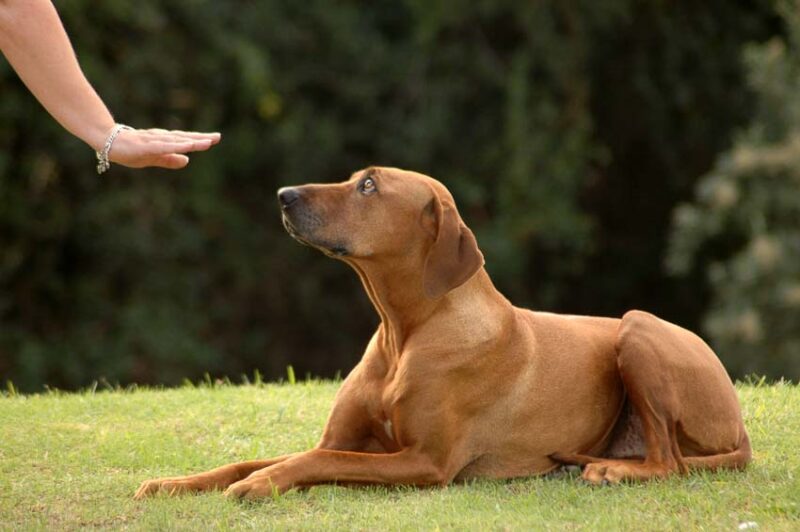
You can teach your dog to pee wherever you want them to, just by using simple commands and a lot of praise. Dogs love to please their humans, and getting the hang of it just takes a little practice.
You can also use a product called Simple Solution Pee Post , which is formulated with pheromones to trigger dogs to eliminate in one spot.
How to Fix Damage from Dogs Peeing on Your Grass
Here are some simple solutions to prevent and fix damage to your lawn caused by dog urine.
Immediate solutions: Rinsing and neutralizing
Rinsing your lawn to lower the nitrogen concentration in dog pee spots is one of the best methods to neutralize dog urine. It’s best to spray your lawn with water immediately after your dog goes potty.
The significance of quick water application
Spraying your lawn or dousing it with water after your dog pees dilutes the nitrogen concentration. This eliminates the potential for it to cause damage to your grass.
As long as your soil drains well, the water will carry the nitrogen through the soil and away from the roots so it can’t harm your grass. You may need to aerate your lawn to improve drainage if you have poorly drained soil.
Homemade remedies for neutralization
Baking soda is the best homemade remedy for neutralizing dog urine on your lawn. Dissolve two tablespoons in a gallon of water and pour it on the affected area.
Repairing damaged patches
Once the damage from dog urine has been done to your lawn, sometimes the only way to fix it is to reseed the dead patches of grass.
You can’t always rely on your grass growing back into the dead patch, particularly if you’re growing a clumping type of grass. If you don’t do anything, weeds will take the opportunity to establish themselves. Once they gain a foothold in your lawn, they will continue to spread.
Re-seeding and nurturing grass back to health
Use a small handheld rake to loosen the soil, remove the dead grass, and plant new grass in the dead patches on your lawn. Then, use a handheld seed spreader to spread the grass seed over the dead patch and water it into the soil.
It helps to use a small amount of mulch over the top to protect the area and keep the seed from being displaced. You can also use a DIY hydroseeding kit , to make minor repairs to dog pee spots.
FAQs About Dog Urine and Grass
Are certain grass types more resistant to dog pee damage?
Cold-season grasses like ryegrass and fescue are more resistant to dog urine damage than other grass types. Zoysia grass is a warm-season grass that’s resistant to dog urine. While Bermuda grass is sensitive to dog urine, it will rebound faster than most types of grass because it spreads by stolons.
Is dog pee the only pet urine that harms grass?
Dogs are the most common cause of pee spots on lawns, but concentrated urine from any source can kill grass, including wildlife like deer and geese, and other domesticated animals, including cats.
Can certain dog foods minimize the grass-killing effect?
Feeding your dog a healthy diet with balanced proteins is better for them. Furthermore, it can also keep their urine from overloading with nitrogen that damages your lawn. You should also ensure your dog drinks a lot of water. This will help dilute the nitrogen content in their urine.
What other natural remedies can I use to prevent lawn damage?
There are several natural methods to prevent lawn damage caused by dog urine. The best one is to train your dog to relieve themselves in a designated spot. Use rock mulch or pea gravel that you can hose down once a week. If your dog doesn’t like that, use artificial grass to make a small potty area.
Are there long-term effects of dog pee on soil health?
Dog urine and excrement can have long-term effects on the health of your soil. This is especially the case if you have a large yard and more than one large dog. Over time, substantial levels of nitrogen and phosphorous are deposited on your lawn, and your soil can only absorb so much of it.

